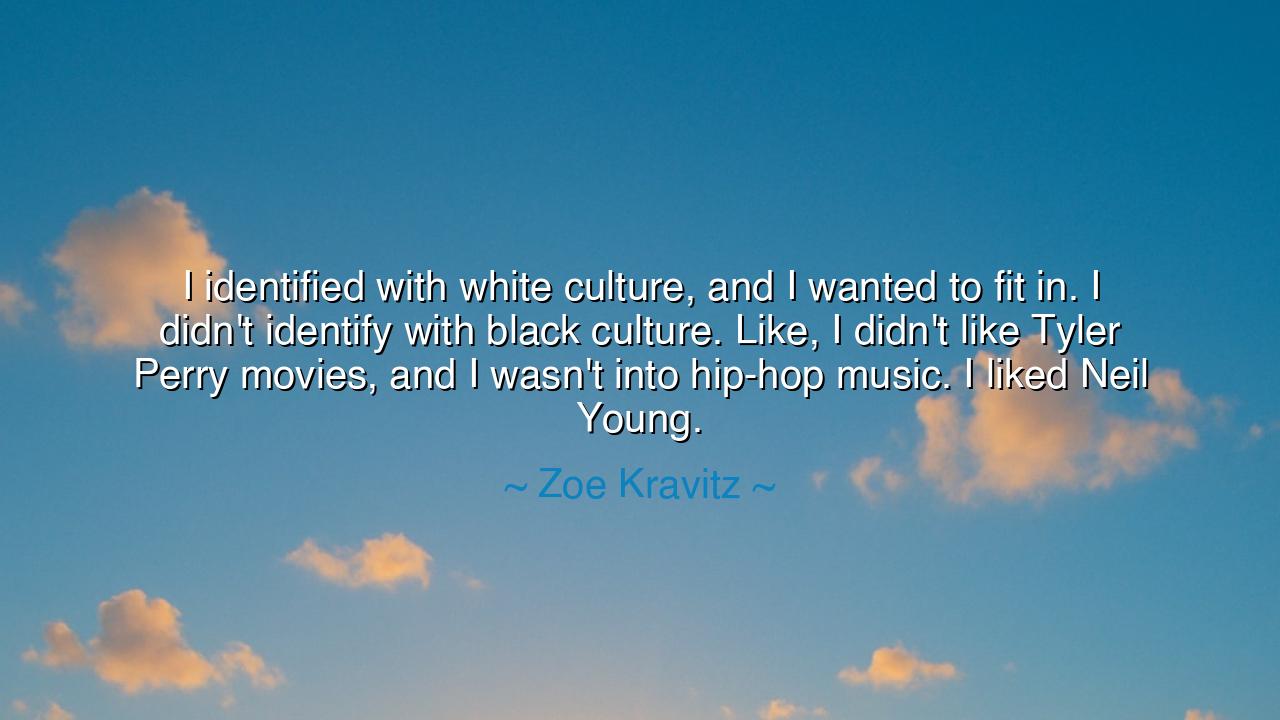
I identified with white culture, and I wanted to fit in. I
I identified with white culture, and I wanted to fit in. I didn't identify with black culture. Like, I didn't like Tyler Perry movies, and I wasn't into hip-hop music. I liked Neil Young.






Hear the words of Zoë Kravitz, who confessed with honesty: “I identified with white culture, and I wanted to fit in. I didn’t identify with black culture. Like, I didn’t like Tyler Perry movies, and I wasn’t into hip-hop music. I liked Neil Young.” These words are not to be taken as rejection, but as a cry of a soul caught between worlds, navigating the tension of identity and belonging. For in her confession is revealed the universal struggle of the human heart—the desire to be accepted, the longing to find home in a culture, and the pain of not fully fitting into the expectations of others.
The ancients knew this yearning. In the tales of Homer, Odysseus wandered for years, searching for a place where he could belong, though he was king of Ithaca. His journey was not only across the seas, but within his own soul. Kravitz, too, speaks of this inner voyage—of seeking identity not in what others prescribe, but in the resonance of her own heart. That she found solace in Neil Young rather than in the popular music of her heritage does not diminish her roots; it speaks to the complexity of identity, which cannot be bound by simple categories.
Her words reveal also the burden of expectation. Society often demands that one must conform to the traditions and tastes associated with one’s race, gender, or community. To diverge is seen as betrayal, or as strangeness. Yet Kravitz teaches us that authenticity is born not from conformity but from courage. To admit, “I was not into hip-hop; I liked Neil Young,” is to declare that her truth is not defined by stereotype, but by choice. This is not arrogance; it is liberation—the freedom to define oneself beyond the narrow cages built by others.
History bears witness to such struggles. Consider the life of W.E.B. Du Bois, who wrestled with what he called “double consciousness”—the sense of looking at oneself through the eyes of others, torn between identities imposed and identities chosen. His vision was to reconcile these fragments into a whole self, neither rejecting one side nor surrendering to the other. Kravitz’s words are a modern echo of this ancient dilemma: how to live authentically when your soul refuses to fit neatly into one cultural mold.
Yet within this tension lies a gift. For the one who does not fully fit in learns to see the world from many sides. They become bridge-builders, able to speak to multiple cultures, to hear multiple songs. By embracing Neil Young while being the daughter of Lenny Kravitz and Lisa Bonet, Zoë embodies the blending of worlds. Her very existence is a tapestry of identities, showing that belonging does not always mean choosing one path over another—it may mean weaving them together into something new.
The lesson is clear: do not let the world’s categories define your soul. You are not bound to like what others expect you to like, nor to adopt traditions simply because of heritage. Instead, honor your roots while embracing your individuality. Let your identity be a garden where many flowers bloom, some inherited, some chosen. For in this freedom lies true strength.
Practical wisdom follows: ask yourself not, “Where do I fit in?” but rather, “What feels true to me?” Seek music, art, traditions, and values that resonate with your spirit, even if they surprise others. Respect your heritage, but do not chain yourself to it. And when you meet others whose identities cross boundaries, honor them, for they are the teachers of unity in a divided world.
So let the words of Zoë Kravitz endure: “I wanted to fit in, but I liked Neil Young.” They remind us that the soul cannot be reduced to a stereotype, nor should it be. Children of tomorrow, take this wisdom to heart: you are not defined solely by race, culture, or expectation. You are defined by the authenticity of your choices, by the courage to live as yourself, and by the harmony you create out of the many voices within.






AAdministratorAdministrator
Welcome, honored guests. Please leave a comment, we will respond soon